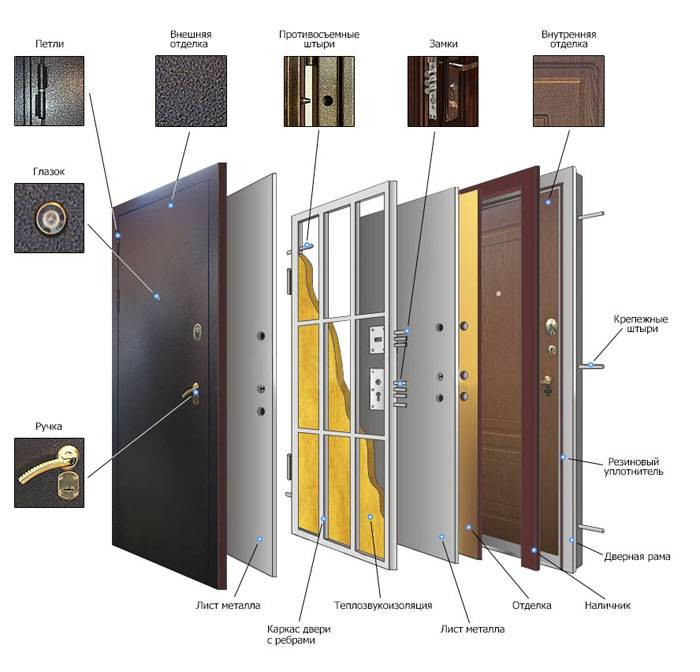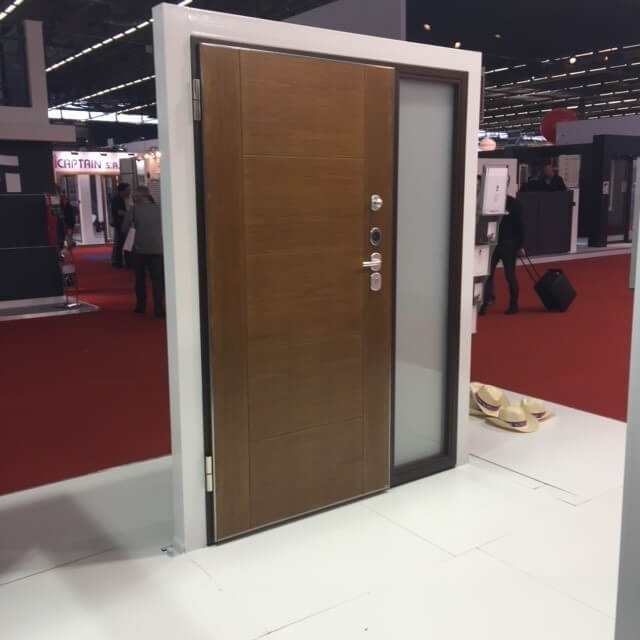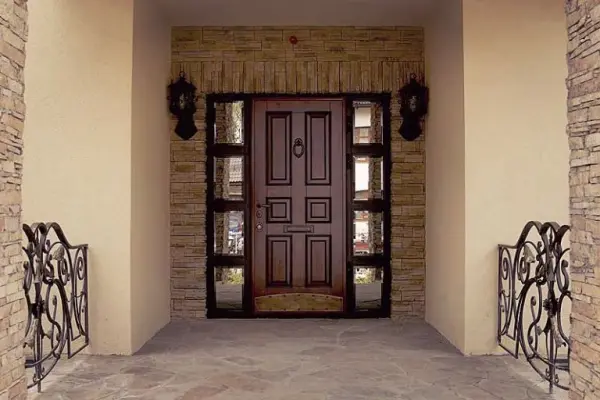Home security begins with the right door. According to SafeHome.org, the home security market reached $56.1 billion in 2025, growing at 8.9% annually. A high-quality armored door is not just a 2mm steel sheet for $800 but a complex multi-layered protection system. How do you choose the right armored door among thousands of options? Entry armored doors must combine structural reliability, aesthetic appeal, and long-term durability. Choosing an armored door today is like choosing a car—numerous options with vastly different quality. Be aware that budget models priced at $300-400 are often merely a decorative imitation of real protection.
Armored Door Characteristics: Key Quality Parameters
 The thickness of the steel in an armored door determines its core strength. Professional installers recommend a minimum of 1.5mm for the inner sheet and 2mm for the outer coating. In my work with private clients, I encounter a surprising issue: models advertised as having 3mm steel often have just 1.2mm. Deception? Absolutely. Steel entry doors require an honest approach to specifications—your safety depends on real parameters, not marketing promises.
The thickness of the steel in an armored door determines its core strength. Professional installers recommend a minimum of 1.5mm for the inner sheet and 2mm for the outer coating. In my work with private clients, I encounter a surprising issue: models advertised as having 3mm steel often have just 1.2mm. Deception? Absolutely. Steel entry doors require an honest approach to specifications—your safety depends on real parameters, not marketing promises.
"Steel thickness matters, but it’s not everything. A well-designed door with 1.5mm steel can be stronger than a poorly made model with a 3mm sheet," says security expert Mikhail Petrov.
Burglar-resistant doors undergo strict classification. The European standard EN 1627 sets clear requirements for resistance to various burglary methods. The protection class of armored doors determines resistance time and the types of tools used:
- RC2-RC3 - resist basic tools (screwdriver, pliers, small crowbar) for 3-5 minutes
- RC4 - withstand professional tools (electric drill, hacksaw, axe) for up to 10 minutes
- RC5-RC6 - provide protection against powerful power tools and specialized equipment for 15-20 minutes
Steel entry doors of RC3-RC4 class are optimal for residential use. Higher classes are used in banks and specialized facilities. Thus, choosing the right protection class determines the actual effectiveness of your investment.
Structural Features of Modern Armored Doors
 Armored steel doors are built like a matryoshka doll. Each layer serves a specific function. Reinforcing ribs form the structural frame, preventing deformation under load. Last winter, I installed a door with 6 reinforcing ribs on a project—after a year of use, there were no signs of sagging or warping. The number of ribs ranges from 3 to 8, but more isn’t always better; proper geometric placement is key.
Armored steel doors are built like a matryoshka doll. Each layer serves a specific function. Reinforcing ribs form the structural frame, preventing deformation under load. Last winter, I installed a door with 6 reinforcing ribs on a project—after a year of use, there were no signs of sagging or warping. The number of ribs ranges from 3 to 8, but more isn’t always better; proper geometric placement is key.
Modern models include advanced technical solutions:
- Reinforced frame made of 40x20mm profiled tubing
- Powder-coated anti-corrosion layer, 40-80 microns thick, depending on operating conditions
- Thermal break to prevent freezing in cold climates
- Multi-contour rubber sealing to block drafts and noise
Reinforced door hinges are critical for heavy structures. Standard hinges support 60-80kg per attachment point, while reinforced models handle 100-120kg. For doors weighing over 100kg, at least three hinges with evenly distributed load are required.
| Characteristic | Standard Level | Premium Level | Impact on Security |
|---|---|---|---|
| Steel Thickness (mm) | 1.5-2.0 | 2.5-3.0 | Direct impact on burglary resistance |
| Number of Reinforcing Ribs | 3-4 | 6-8 | Prevents deformation |
| Lock Type | 1 cylinder lock | 2 locks + protective plates | Critical impact |
| Protection Class | RC2-RC3 | RC4-RC5 | Burglary resistance time |
| Structure Weight (kg) | 70-90 | 120-150 | Indirect impact on strength |
This table highlights key differences between protection levels, aiding in an informed choice based on budget and security needs.
Locks for Armored Doors: The Heart of the Security System
.jpg) The thickest steel is useless without quality locks. Cylinder mechanisms are convenient for daily use but vulnerable to drilling. Lever locks are harder to pick but take longer to open. Protective plates significantly increase break-in time—independent tests show protected locks take 2-3 times longer to breach than standard ones.
The thickest steel is useless without quality locks. Cylinder mechanisms are convenient for daily use but vulnerable to drilling. Lever locks are harder to pick but take longer to open. Protective plates significantly increase break-in time—independent tests show protected locks take 2-3 times longer to breach than standard ones.
"In a recent project, a client opted to save on locks, installing a $15 Chinese model. The result was predictable: the door was breached in 3 minutes with a flat screwdriver. A quality European lock costs from $80 but ensures real protection," says installer Alexey Morozov.
Armored door hardware includes anti-removal hinges and reinforced handles. The door peephole should provide a 180-degree view without distortion. Modern video peepholes record events and transmit images to the owner’s smartphone. Anti-cut pins protect hinges from being sawed off with a grinder—a simple yet effective solution.
Door Insulation: Comfort and Savings
Entry armored doors address both security and energy efficiency. Quality door insulation can reduce heat loss by 15-25%, depending on climate and building type. Mineral wool with a density of 40-80 kg/m³ offers an optimal balance of thermal protection and weight. Why does this matter? Proper insulation can partially offset the cost of an insulated door through heating savings, especially in harsh climates.
Home security encompasses protection from cold, noise, and burglary. Modern technologies expand possibilities:
- Electronic locks with code access and remote control via mobile app
- Video peepholes with recording on up to 32GB memory cards and smartphone data transfer
- Door closers with adjustable closing speed from 3 to 15 seconds
- Access control systems supporting cards, biometrics, and PIN codes
- Integration with smart home systems via 802.11n Wi-Fi modules
A well-made and properly installed door can last 15-25 years without major repairs, depending on usage intensity and conditions. Burglary protection remains effective throughout its lifespan if certified materials and proper installation techniques are used.
Choosing an Armored Door Manufacturer: Who to Trust with Security
It’s important to understand the distinction: "armored doors" in everyday terms are burglar-resistant steel doors. True armored doors protect against firearms and are used in specialized facilities.
The market for low-quality doors thrives due to buyer unawareness. Fake armored steel doors are sold as high-quality models with glossy catalogs and bold promises. Telltale signs of counterfeits are clear to experienced eyes:
- Steel thickness less than 1.2mm (easily checked with a strong magnet)
- No reinforcing ribs inside the door panel
- Fake protective plates made of 0.5mm stamped metal
- Uneven weld seams with overlaps and incomplete welds
- Lack of original certificates or use of forged documents
A genuine high-quality armored door has perfect geometry, uniform powder coating without drips, and smooth mechanism operation without jamming. Choosing a trusted armored door manufacturer is the first step toward real security, not a decorative illusion of protection.
Armored Door Certification and Quality Standards
Armored door certification confirms compliance with stated specifications. The European standard EN 1627 is globally recognized. Certificates include test results for burglary resistance using specialized tools. Forged certificates are a common market issue.
"In 2024, the Johnson family in Chicago chose an RC4-certified door for $1,200. Six months later, burglars spent 18 minutes attempting a break-in and left empty-handed. The investment in quality paid off," says insurance agent Tom Wilson.
I often notice attempts to sell uncertified doors at discounted prices. It’s like buying a car without paperwork—savings lead to problems. Always demand original certificates before purchasing.
Common Mistakes: How to Avoid Overpaying for Unnecessary Features
Most buyers make predictable mistakes. Overpaying for decorative elements can account for 40% of the cost. Forged overlays look impressive but don’t enhance burglary resistance. Skimping on locks is a fatal error: a $20 Chinese lock turns an expensive door into a decorative but useless barrier.
Common mistakes when choosing:
- Buying based on photos without inspecting a showroom sample
- Ignoring verification of quality certificates and standards compliance
- Self-measuring the doorway without accounting for frame thickness and installation gaps
- Attempting to save on professional armored door installation
- Trusting suspiciously low prices and "deal-of-the-century" promotions
In a recent case, a client bought a "premium" door for $600, which turned out to be a Chinese counterfeit. The right choice requires balancing reasonable price, verified quality, and necessary features. Home security doesn’t tolerate a careless approach to critical characteristics.
Armored Door Installation: Reliable Installation Technology
 Quality armored door installation determines the structure’s longevity. Installation in load-bearing brick or concrete walls ensures maximum fastening strength. Removing old structures takes 2-4 hours, depending on the doorway type, and requires specialized tools. Doorway preparation includes aligning geometry with a tolerance of no more than 3-5mm vertically and horizontally. Professional armored door installation costs $150-250 but guarantees trouble-free performance for years.
Quality armored door installation determines the structure’s longevity. Installation in load-bearing brick or concrete walls ensures maximum fastening strength. Removing old structures takes 2-4 hours, depending on the doorway type, and requires specialized tools. Doorway preparation includes aligning geometry with a tolerance of no more than 3-5mm vertically and horizontally. Professional armored door installation costs $150-250 but guarantees trouble-free performance for years.
Key steps for a smart choice:
- Accurate doorway measurements, accounting for frame thickness and 5-20mm installation gaps depending on fastening type
- Determining the required protection class based on the property’s risk analysis
- Selecting the optimal lock type and quantity based on usage intensity
- Choosing exterior finishes that harmonize with the building’s architectural style
- Thoroughly verifying certificate authenticity and warranty terms
I often see clients trying to save on installation. The result is predictable: misalignment, drafts, and premature lock wear. Armored doors with professional installation from a trusted contractor are an investment in peace of mind, not an expense.
Armored Door Price: What Drives the Cost
Transparent pricing helps avoid overpaying. Steel thickness and grade account for 40% of the structure’s cost. Locks and protective hardware add 25-30% to the base price. Finishing materials and design solutions contribute 15-20% to the cost. Certification, manufacturer reputation, and warranty obligations make up the remaining 10-15%.
Real market price segments for 2025:
- Budget category ($400-800): 1.5mm steel, one cylinder lock, film coating
- Mid-range ($800-1500): 2mm steel, two-lock combination, MDF panels or laminate
- Premium segment ($1500-2500): 2.5-3mm steel, multi-level protection system, natural veneer or solid wood
Armored door installation adds $150-300 to the total cost, depending on the project’s complexity. Delivery is typically included when ordering professional installation. Buying armored doors during the off-season can save up to 25% off retail prices.
Armored door installation adds $150-300 to the total cost. Delivery is usually included with professional installation. Purchasing during seasonal promotions can save up to 25%.
Buyer’s Checklist: A Systematic Approach to Choosing
A smart choice requires a step-by-step approach. Spontaneous decisions in security matters are unacceptable. Order armored doors only after thoroughly analyzing all parameters and comparing offers from at least three suppliers.
Proven action sequence:
- Determine the optimal protection class: RC3 for urban apartments, RC4 for suburban homes
- Conduct professional measurements: height, width, and depth of the doorway, accounting for wall irregularities
- Plan the lock system: at least two different types of locks with protective plates
- Verify certificate authenticity: demand original documents with holograms
- Research supplier reputation: client reviews, years in business, project portfolio
- Clarify warranty terms: duration, covered cases, service center locations
- Agree on installation details: cost inclusion, timeline, debris removal
Personal inspection of samples is mandatory. Catalog photos don’t convey weld quality, steel thickness, or mechanism smoothness. Proper preparation for purchase saves time, money, and stress during use.
Conclusion
Choosing a high-quality burglar-resistant door is a long-term investment in safety and comfort. Don’t skimp on critical structural elements. Steel thickness and quality, lock reliability, original certification, and professional installation determine the real effectiveness of your home’s protection.
Remember: in security matters, careless savings can lead to irreparable losses. Properly chosen entry armored doors ensure long-term protection and family peace of mind. When choosing, focus not only on price but also on technical specifications, manufacturer reputation, and service quality.

